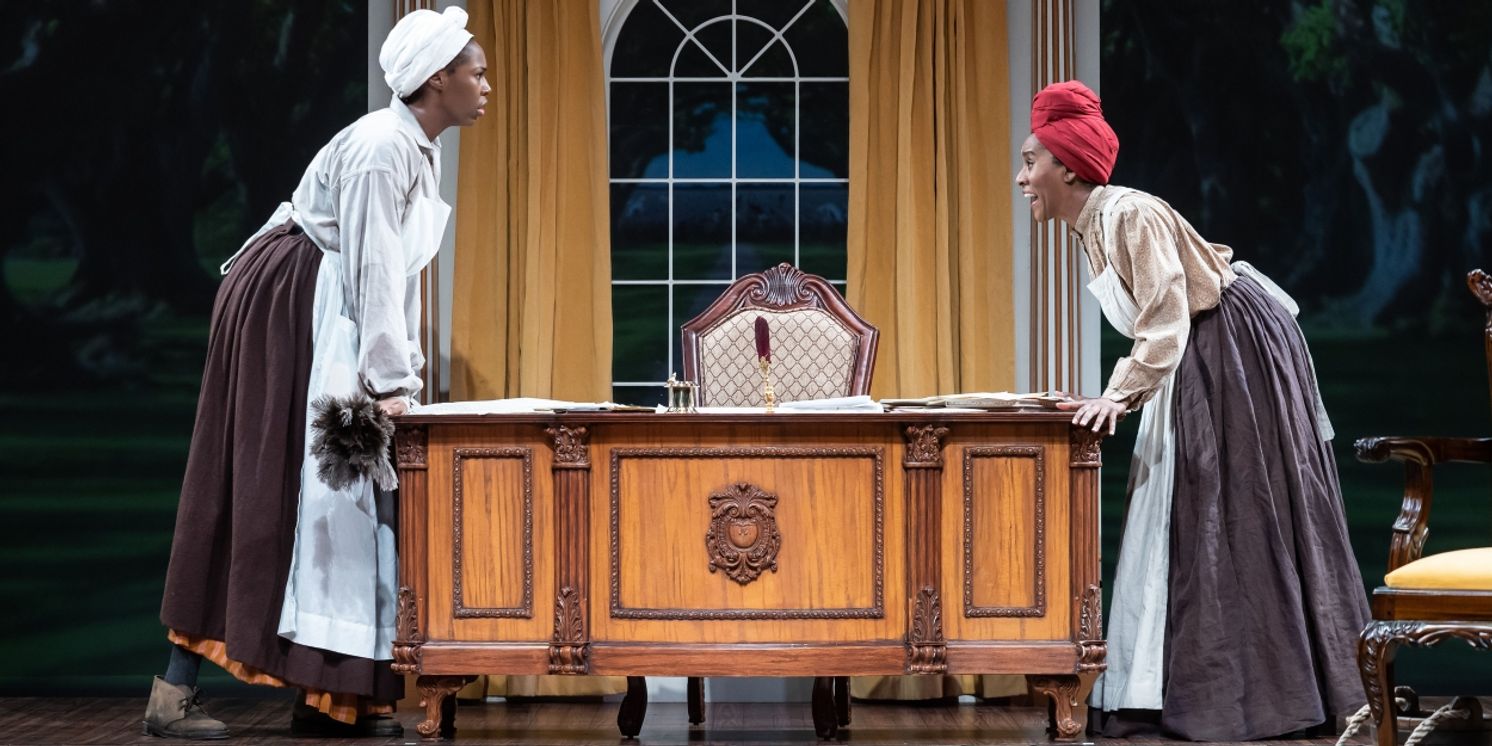Review: CONFEDERATES at Loretto-Hilton Center For The Performing Arts
Gender bias, personal freedom and the role of the individual are provocatively explored in the Repertory Theatre St. Louis’ Confederates.

Gender bias, personal freedom and the role of the individual are provocatively explored in the Repertory Theatre's gripping St. Louis' Confederates. Penned by Dominique Morisseau, this emotionally powerful production is set in two different eras, allowing the audience to explore racial equality through the lens of two women separated by more than a century and a half.
While these stories do not intersect, the situations these women find themselves is similar in that each struggle to stand on equal footing with their counterparts. Sadly, the walls each heroine struggles to tear down have changed little between their timelines.
The first tale revolves around Sara, an enslaved woman coerced into becoming a Union spy. Her ability to read and write has made her acutely aware of the world. Determined to be free, she is anxious to join her brother Abner in fighting for the Union. However, as she pushes to find her place, she encounters sexism and harsh judgement from others on her plantation.
Her desire to join the fight take a turn after she is visted by Missy Sue, the plantation owner's daughter, whom is sympathetic to emancipation. Missy Sue arranges for Sara to be assigned for work inside the plantation, where she can collect valuable information to share with Union operatives.
Despite their mutual interest in defeating the Confederacy, the two women have their own passions and distinct agendas, making for a mutually beneficial but all be it, uneasy relationship.
The intrigue gains intensity when Sara's activities draw the interest of Luanne, the slave whose position she has taken. Curious about her motives, Luanne confronts Sara but gets very little information from her. Looking to ease tensions and keep Luanne from talking, Sara agrees to teach her how to read and write.
As the war drags on, Sara continues to send intelligence to her Union contacts. However, despite her efforts, she remains frustrated that her compatriots do not treat her equally because of her gender. Undaunted, Sara remains committed to her mission and eventually escapes. Finally, independent, she addresses a group of abolitionists, underscoring the importance of her work in fighting slavery and overcoming gender inequality.
Morisseau's other timeline takes place in the modern world and centers on Sandra, a tenured professor at a mostly white college who becomes upset after a photo of a slave wet nurse breast feeding a white child is placed on the door of her office. Adding insult, the photo is doctored to include Sandra's face on the image.
Looking for retribution, she challenges the college's leaders to find the person responsible. In spite of her frustration over the situation, Sandra remains focused on her work. Persevering onward, Sandra remains devoted to her mission of providing her pupils with perspectives and insights that will serve them well after graduation.
As the drama unfurls, the audience discovers that Sandra is at odds with Malik, one of the few African American students on campus. Clashing over the grade his paper received, he feels singled out because of his race. Despite the friction between them, Sandra points out to Malik that he is a good student and suggests he revise his paper to get a higher grade.
The politics of academia are added to the mix when Sandra is visited by Jade, another Black faculty member on campus. Concerned that her request for tenure status will be blocked by her colleague, she stops buy Sandra's office. Their chat does not go well. The ensuing conversation, delivered with crisp dialogue and intense passion, covers rough territory; race, social status, gender, social perceptions and support.
Executed with poignancy, The Rep's production of Confederates, guided by Dominique Morisseau's vison and executed by director Elizabeth Carter comes to life through the work of an incredible cast. Tiffany Oglesby and Tatiana Williams drive the show as Sara and Sandra respectively strive for autonomy. Oglesby's powerful performance resonates with audiences as she brings the hardship and desperation of slavery to the forefront. The same goes for Williams who speaks truth to power in a commanding performance.
Celeste M. Cooper is magnificent in support as both Jade, a gritty professor who has fought to establish her career, and as Luanne, a slave whose displacement in the plantation caste cuases anxiety. Cooper's turn in both roles is profoundly moving an electrifying.
Also exceptional are Tracey Greenwood as both Missy Sue and Candace, Sandra's work study assistant. Rounding out the ensemble is Xavier Scott Evans who is terrific in the roles of Malik and Abner. Like Cooper and Greenwood, he wears both hats well, creating two powerful characters.
Collectively, the ensemble deepens the drama occurring during both time periods. As a result, Confederates is a thought-provoking production that holds nothing back in calling out challenging subjects like systematic racism and gender. Punctuated with light moments of humor, this inspired and relevant production is powerful and compelling theater.
The Rep's presentation of Confederates runs through March 5th. For more information, visit www.repstl.org
Reader Reviews
Videos

